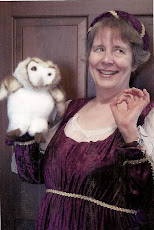Below the darkened theatre marquee stood a little goblin-like old man. I talked to him briefly. He had a dark, gray old-fashioned hat with a brim turned down. He lit up a cigarette, and I could see his face. Charles Lawton! I couldn’t believe it.
“Mr. Lawton. You’re a famous person, and you’re talking to me! And if I remember correctly, you’re dead!”
“Heh heh!” he responded, “Well, as a matter of fact, yes, you’re quite correct.”
A little curly-haired lady came out of the shadows.
“I would like to introduce you to my wife,” he continued in his dignified manner, “Elsa Lancaster.”
She was also most gracious.
“Well, as I recall, you’re also dead.”
“Why, yes,” she said, “You’re very precise.”
“But why are you giving me the time of day?”
“It has to do with broken dreams,” said she, “Come, let us show you what the old theatre was like in its hey day.”
He took out a large golden key, not an ordinary key, one that opened to another dimension.
As the door appeared, wavy lines appeared, and we entered. We entered into the outer lobby, then, the inner lobby, finally, into the house, and we looked about. There they were, the audience, only dressed quite differently from the 21st century.
And on the stage was a trio, a father, mother, and son, throwing the latter about. He was never hurt, however, for his body was quite elastic, acrobatic, and mobile. His face never changed expression. Could it be? Buster Keaton.
The flapper-looking audience “oohed” and “aahed”. At intervals, they chuckled and guffawed.
It was time for a new guest act, Burns and Allen, looking younger and quite different from their TV days.
The other lesser acts that continued to bring laughter and joy to the spectators. I felt one with this crowd, dejavu, like I belonged there.
As if Charles and Elsa could read my thoughts, I heard her say,
“But you did live then…”
“That’s why you feel that sense of belonging,” said he.
“Who was I?” I responded. “You were their coach.”
I must have looked disappointed, “Oh, a coach, just a coach.”
“There’s no just anything. They needed you to correct them, to teach them, to lead them, just as you were doing in this lifetime, only for children.”
And as the theatre audience began to shuffle out, the cast of performers called me up to the stage and showed how their trunks got carried down from the second floor rooms. They were getting ready to strike the set and depart.
But a party was gathering in my honor. They looked grateful.
“A toast to you, our teacher. You are an important part of what brings out our excellence. Loving the theatre sometimes means being invisible, but meaningful and above all, a helpful servant.”
“But I wanted to be more, working directly on the stage!” I protested.
They looked incredulous. One of the astonished members of the company asked, “What could be more direct than being responsible for the entire script?”
“I don’t know what you mean.” I responded.
“How can we make it any clearer?” inquired another, “You’re the playwright.”
“You see,” said Elsa, “I told you it has to do with broken dreams.”
“Was Shakespeare remembered for his acting or a different legacy?” Mr. Lawton raised his golden key, and all at once the key turned into a golden quill pen.
Elsa provided the parchment on a magically appearing writing desk.
And as he pulled back a materializing chair, I heard Mr. Lawton say, “Write.”
Sunday, July 15, 2007
Subscribe to:
Post Comments (Atom)





1 comment:
Very dreamy. A free-floating inspirational. Post more.
Post a Comment